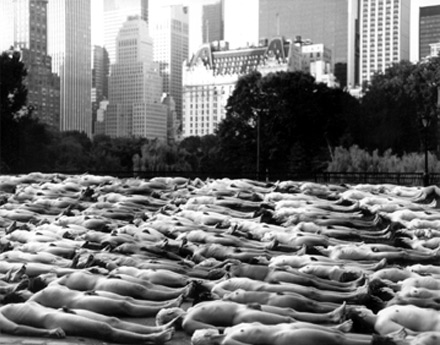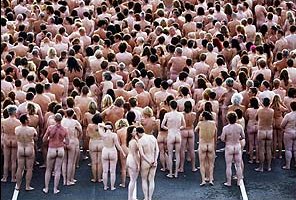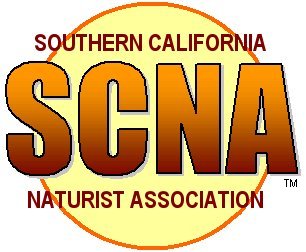 www.socalnaturist.org |
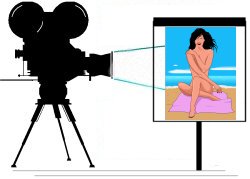
|
The Movie BuffTM:
|
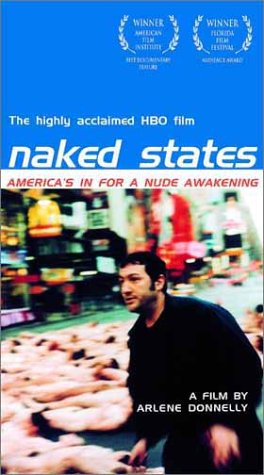
|
Name of Film:
Naked States
Our Rating:
With apologies to Madonna, this fascinating documentary about nude photographer/artist Spencer Tunick should have been named "Nude Ambition."
Among the highest rated documentaries ever to on air on HBO, Arlene Donnelly's film invites you to join the notorious Tunick on his five-month road trip across America as he talks strangers out of their clothes and then takes photographs of them in some very public places. His goal: photograph a nude in every state for his next New York exhibition.
In other words, the ambitiously-driven Tunick does what Howard Stern only talks about. Except where Stern is sleezy, Tunick is a little whiny at times.
The photo shoots range from individuals standing alongside a freeway overpass to blocking traffic in the middle of a New York City street to literally thousands of nude people lying on an airport runway. The film contains, obviously, quite a bit of full-frontal nudity, but none of it is eroticized--an interesting achievement in itself.
Many of the people Tunick picks to model are just regular people he meets off the street, while others answer ads placed in newspapers. The documentary interviews many of them along the way and their reasons for posing are facinating at times. There's an amusing scene of a tough biker guy getting angry at Tunick when Tunick asks his daughter to pose for him, and another subject is a rape victim being photographed as part of her healing process. One larger lady shares a very moving, personal moment about how being a model was a wonderful experience and how good she felt in her heart and mind. You've got to admire these people for their courage and honesty, and also for wanting to be part of history.
Tunick appears quite detached from all that, however. He is internally-driven to get his vision into his camera and so often seems to see his subjects not as human beings but simply as dull, inanimate props to contrast against the chosen landscape. I would have liked to have seen Donnelly spend a little more time on Tunick's artistic philosophy to explain why his photos come out looking so lifeless.
At times the camera catches him being inarticulate about what he wants his vision to be and when folks don't get it, he gets angry. I did wince with him when he was photographing a group of uncooperative Tri-State nudists at Sandy Hook beach, who had their own ideas about how to be photographed. They force him to strip too, which he reluctantly does, since it is the only way he will get the shot he wants (Don Speers, who heads the nudist club, talks briefly on camera about body acceptance and how government imposes a sense of shame on people for forcing them to wear clothes, yet in the film it seems the nudists are imposing a form of reverse discrimination on Tunick.) Spencer is obviously uneasy about his own skin, and he whines to the camera that he needs his pockets for his rolls of film. He considers the group rude, especially when a few males keep showing off in front of the camera. "I am not a nudist," he sighs afterwards, "and I'll never become one after this experience."
The oddessey ends with a showing of his completed photographs in a New York gallery. The finished black and white pictures will look amazing to some, lifeless to others. Most of his photos show his human subjects in apocalyptic poses or as unemotional objects in uninteresting landscapes, but I think they also give us a window into Tunick's own detached and isolated personality. Some of his subjects are present at the exhibit too, and comparised to Tunick, many are quite animated with pride about their contribution and how liberating it felt to pose nude. I wondered how many of them have participated in anything nudist since that time?
At the exhibition we see that several magazines formerly not interested are paying attention to his work now. Yet despite his hunger for publicity Tunick announces he doesn't want the "tabloids" to cover his art as he feels they will cheapen its merit! I guess the man has standards after all.
The documentary was filmed in a "camcorder-gritty" style, which works for the most part, even if the occasional bounciness of the camera is distracting at times. The DVD version contains a second short film, "Strawberry Fields," which chronicles one of the shoots in New York's Central Park. But there is no other "Making of..." extra on the DVD, nor an over-film commentary by either Tunick or Donnelly which could clarify the process we are watching. Unfortunately viewers never get a real sense of what transforms an ordinary photo into a work of art, and that is the critical piece missing here.
I was afraid initially that this film might turn out to be just a cheesy, cheap exploitation flick, but I was pleasantly surprised. Naked States is a good (but not great) documentary, very tasteful and intelligent. The filmmaker avoids cliches and stereotypes and shows Tunick as a real human being with real flaws, like his obsessiveness, his anxiety, his ambition for status in the art world. It should also be applauded for its unpixilated and honest display of the human form in all its shapes, sizes and colors.
|
Review by Gary Mussell, SCNA Film Critic
Email Us Your Comments About This Review
